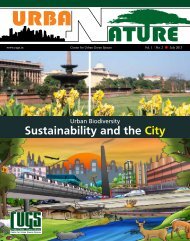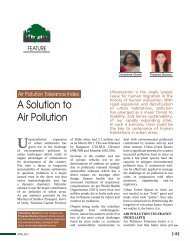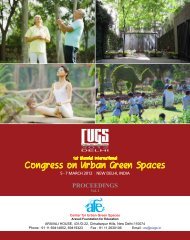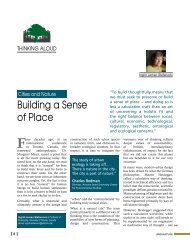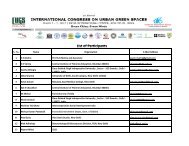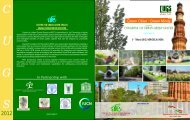26-27 August 2013 - Center for Urban Green Spaces
26-27 August 2013 - Center for Urban Green Spaces
26-27 August 2013 - Center for Urban Green Spaces
You also want an ePaper? Increase the reach of your titles
YUMPU automatically turns print PDFs into web optimized ePapers that Google loves.
<strong>Center</strong> <strong>for</strong> <strong>Urban</strong> <strong>Green</strong> <strong>Spaces</strong><br />
Aravali Foundation <strong>for</strong> Education<br />
www.cugs.in<br />
Association of Municipalities<br />
and Development Authorities<br />
www.amdaindia.org<br />
National Workshop<br />
on<br />
URBAN GREEN SPACES<br />
Udaipur | Rajasthan<br />
<strong>26</strong>-<strong>27</strong> <strong>August</strong> <strong>2013</strong>
C<br />
reation and management of green<br />
spaces (including urban <strong>for</strong>ests) has<br />
gained importance as urbanization<br />
becomes the most significant reason <strong>for</strong><br />
human migration in the world. <strong>Urban</strong><br />
<strong>Green</strong> <strong>Spaces</strong> provide town and city<br />
dwellers with significant environmental,<br />
recreational and material benefits. They<br />
are also home to a vast diversity of flora<br />
and fauna and are recognized as important<br />
repositories of biodiversity.<br />
This is particularly true <strong>for</strong><br />
developing countries where urbanization is<br />
progressing at an unprecedentedly rapid<br />
rate and a demographic switch from a<br />
predominantly rural to a predominantly<br />
urban society is taking place. UN figures<br />
indicate that in 1990 only 37% of the total<br />
population of developing countries was<br />
living in urbanized area. It is predicted that<br />
by the year 2025 the proportion will be 61%. Already rapid and uncontrolled<br />
urbanization in many developing countries is having fundamental social<br />
and environmental consequences. The role of <strong>Urban</strong> <strong>Green</strong> <strong>Spaces</strong> in<br />
ameliorating this situation is critical and needs to be recognized in planning,<br />
creation and management of rapidly expanding urban human settlements.<br />
From every angle - demographic, environmental or social - cities in<br />
the Indian subcontinent are far more significant today. In India alone, they<br />
are home to an estimated 340 million people, or 30% of total population. By<br />
2030, existing and new Indian cities are expected to provide shelter to 590<br />
million people, or 40% of the population. It is a fact that urbanization in<br />
Indian sub-continent is well underway, and will continue.. There is an<br />
urgent need to engage with this reality of an <strong>Urban</strong> future and look <strong>for</strong><br />
answers to questions about longterm sustainability and environmental<br />
robustness of our cities.<br />
Objectives<br />
Ÿ To sensitize participants about criticality of<br />
urban green spaces in the context of<br />
emerging urbanization scenario.<br />
Ÿ To exchange in<strong>for</strong>mation on best practices and<br />
analyze success stories from the field.<br />
Ÿ To in<strong>for</strong>m about tools and mechanisms<br />
available <strong>for</strong> management of urban green<br />
spaces.<br />
Ÿ To provide opportunities of networking with<br />
peers from different geographical settings.<br />
Workshop Structure<br />
Ÿ Theoretical perspectives functional role of<br />
urban green spaces<br />
Ÿ Case studies of successful initiatives from<br />
various parts of the country.<br />
Ÿ Technical sessions on tools and techniques in<br />
urban green space management<br />
Participation Profile<br />
This program is exclusively <strong>for</strong> the senior officers of the level of Sr. Environment<br />
Engineer, Sr. Architect/Planner, Superintending/Executive Engineer of Municipal<br />
Corporation/Councils, Development Authorities and State Pollution Control Boards<br />
from different parts of the country.<br />
Number of Seats and Nomination Deadline<br />
The number of seats are limited to 60 and will be filled on first come first serve basis.<br />
Nomination must reach AMDA by July 31, <strong>2013</strong> by email, fax, or courier as per details<br />
overleaf.<br />
Fee<br />
Ÿ<br />
Field Trip and Interactive Discussions.<br />
There is no delegation/participation fee as the program is being sponsored by<br />
Association of Municipalities and Development Authorities. However, TA/DA of the<br />
participants will have to be borne by the concerned State Governments/Agencies.<br />
In year 2008 the world<br />
crossed an important<br />
demographic milestone when<br />
urban population on Earth<br />
equaled its rural population,<br />
<strong>for</strong> the first time in<br />
human history.<br />
<strong>Urban</strong>ization in Asia has been<br />
growing at a rapid rate and is<br />
expected to accelerate in<br />
the future. It is <strong>for</strong>ecasted that<br />
17 out of <strong>27</strong> world's largest<br />
mega-cities will be<br />
in Asia by 2015.<br />
Today, 310 million people live<br />
in India's cities. By 2030, this<br />
number will be 575 million.<br />
By 2045, 800 million!. Every<br />
minute, 30 Indians leave<br />
rural India <strong>for</strong> its cities!!<br />
<strong>Urban</strong> parks, gardens and<br />
natural landscapes are better<br />
known <strong>for</strong> their non market or<br />
intangible benefits. The flow<br />
value of annual output of <strong>for</strong>est<br />
eco system goods and services in<br />
Beijing, China has been estimated<br />
to be around $6.3 billion.
Association of Municipalities<br />
and Development Authorities<br />
The Association of Municipalities and<br />
Development Authorities (AMDA), established in<br />
1983, is an Association of 73 Municipalities and<br />
Development Authorities in the country. The<br />
Association, as the name signifies, addresses the<br />
issues pertaining to interface between the state,<br />
municipal bodies and urban development<br />
authorities in the realm of urbanization, urban<br />
development and urban governance.<br />
It offers (a) a valuable <strong>for</strong>um <strong>for</strong> members to<br />
exchange ideas of topical interest in the field of<br />
urbanisation; (b) in<strong>for</strong>mation on good practices in<br />
the field of urban development through<br />
newsletters, workshops, seminars, training<br />
programmes, applied research and the kind; and<br />
makes (c) a valuable contribution in the field of<br />
planned urban settlements and their development.<br />
The Association has emerged as a<br />
knowledge-integration and experience exchange<br />
plat<strong>for</strong>m across the country, besides per<strong>for</strong>ming an<br />
advocacy and interfacing role to improve efficiency<br />
of urban local bodies and development authorities.<br />
For over two decades, AMDA has been working on<br />
issues of planned development and management<br />
of cities by sensitising local, state and central<br />
governments.<br />
CENTRE FOR URBAN GREEN SPACES<br />
ARAVALI FOUNDATION FOR EDUCATION<br />
<strong>Center</strong> <strong>for</strong> <strong>Urban</strong> <strong>Green</strong> <strong>Spaces</strong> at AFE is<br />
committed to: (a) Promoting a higher appreciation of<br />
the role of urban green spaces amongst urban<br />
planners, policy makers and citizens, and (b)<br />
Working with urban civic agencies to optimize the<br />
flow of tangible and intangible benefits of urban<br />
green spaces that can be enjoyed by proximate<br />
communities.<br />
Aravali Foundation <strong>for</strong> Education (AFE) is an<br />
organization dedicated to creating a civil society that<br />
is conscious of the problem of (and possible<br />
solutions to) the steady degradation of earth’s<br />
unique ability to provide various <strong>for</strong>ms of life with a<br />
livable habitat. Set up in 2004, AFE strives to achieve<br />
its mandate by designing and implementing<br />
innovative programs aimed at bridging the<br />
in<strong>for</strong>mation divide that exists between the world of<br />
conservation research and the civil society on one<br />
hand, and between research and the policy making<br />
establishment on the other.<br />
AFE proactively seeks to bring together<br />
institutions from diverse fields of education,<br />
conservation, science and business on a common<br />
plat<strong>for</strong>m to work together and enhance human and<br />
institutional capabilities <strong>for</strong> addressing<br />
environmental concerns.<br />
Program Venue<br />
Contact point <strong>for</strong> sending nominations and further in<strong>for</strong>mation:<br />
Director<br />
ASSOCIATION OF MUNICIPALITIES AND<br />
DEVELOPMENT AUTHORITIES (AMDA)<br />
7/6, Siri Fort Institutional Area, <strong>August</strong> Kranti Marg, New Delhi - 110049<br />
Tel. No. : 011-<strong>26</strong>494486, <strong>26</strong>497973 Fax : 011-<strong>26</strong>491675<br />
Email : amdadelhi@gmail.com Website : www.amdaindia.org
NATIONAL WORKSHOP ON URBAN GREEN SPACES<br />
<strong>26</strong>-<strong>27</strong> <strong>August</strong> <strong>2013</strong> | UDAIPUR, Rajasthan<br />
Day 1<br />
Registration: 9.00 AM -10.00 AM<br />
Inaugural Session 10.00-11.00 AM<br />
Member Secretary, NCR Planning Board | Mayor of Udaipur<br />
Inaugural High Tea 11.00-11.30 AM<br />
11.30 AM-1.00 PM<br />
Session 1 : URBANISATION : A PERSPECTIVE<br />
<strong>Urban</strong>isation in India -Trends and Implications<br />
Manoj Dabas, Director, <strong>Center</strong> <strong>for</strong> <strong>Urban</strong> <strong>Green</strong> <strong>Spaces</strong><br />
<strong>Urban</strong> <strong>Green</strong> <strong>Spaces</strong>-Imperatives <strong>for</strong> <strong>Urban</strong> Planning<br />
Neeraj Gupta, Professor, Faculty of Architecture, Central University of Rajasthan,<br />
Ajmer<br />
<strong>Urban</strong> <strong>Green</strong> <strong>Spaces</strong> – A National Overview<br />
Sanjeev Gupte, Dean, Buddha College of Architecture, Udaipur<br />
Lunch 1.00-2.00 PM<br />
2.00-3.3.30 PM<br />
Session 2-URBAN GREEN SPACES-Functional Role and<br />
Institutional Innovations<br />
<strong>Urban</strong> <strong>Green</strong> <strong>Spaces</strong> - Energy Efficiency| Heat Island Effect<br />
To be Decided<br />
<strong>Urban</strong> <strong>Green</strong> <strong>Spaces</strong> - Birds in Cities | Issues and Challenges<br />
Dr. Raza Tehsin, Member, Wild Life Preservation Society of India<br />
<strong>Urban</strong> <strong>Green</strong> <strong>Spaces</strong>-Store Houses of Biological Diversity<br />
S K Sharma, Rajasthan Forest Department<br />
<strong>Urban</strong> <strong>Green</strong> <strong>Spaces</strong>-Safe Guarding Human Health<br />
Ritu Rai, Asso. Professor, Dept.of Architecture, Central University of Rajasthan<br />
Tea 3.30-4.00 PM
4.00PM-5.30PM<br />
SESSION 3 – URBAN GREEN SPACES: ADDRESSING<br />
BOTTLENECKS<br />
Group Exercise<br />
Entire group divided into three subgroups to deliberate issues and<br />
challenges associated with a particular dimension of urban green<br />
spaces and also come up with recommendations to effectively address<br />
the same:<br />
a) <strong>Urban</strong> <strong>Green</strong> <strong>Spaces</strong>- Engaging Communities and beneficiaries<br />
b) <strong>Urban</strong> <strong>Green</strong> <strong>Spaces</strong>- Mobilizing Resources (including PPP)<br />
c) <strong>Urban</strong> <strong>Green</strong> <strong>Spaces</strong>- Regulatory Issues including incentives<br />
* Each group to make a 15 minute presentation after tea session on<br />
Day2<br />
Day 2<br />
10.00 -11.30 AM<br />
Session 1: UGS-HORTICULTURAL PRACTICES AND CONCEPTS<br />
Site Specific Species Selection<br />
Dr. L.N. Mahawer, Assoc. Professor (Horticulture)<br />
Vertical <strong>Green</strong>ery/Roof Top Gardens<br />
Dr. R.A. Kaushik, Professor (Horticulture)<br />
Food Production in <strong>Urban</strong> Landscapes<br />
Dr. Deepak Kumar Sarolia, Asstt. Professor (Horticulture)<br />
Tea 11.30-12.00<br />
12.00 -12.45 PM<br />
Session 2:Sub Group Presentations: 15 Minutes each<br />
Lunch 12.45-1.30 PM<br />
Field Trip (To Gulab Bagh)<br />
Leader-Mr. Madhusudan Rawal, Addl. Chief Engineer, PWD, Udiapur<br />
Gulab Bagh is the largest garden in Udaipur. Spread over 100 acres the garden has<br />
innumerable varieties of roses, which is also the reason it is called Gulab Bagh.<br />
Gulab Bagh was started by Maharana Sajjan Singh in the 1878. Various Flower and<br />
Vegetable shows are organized in the Garden starting from the first one in 1888 by<br />
Maharana Fateh Singh.<br />
Return to Venue 4.30 PM | Dispersal



